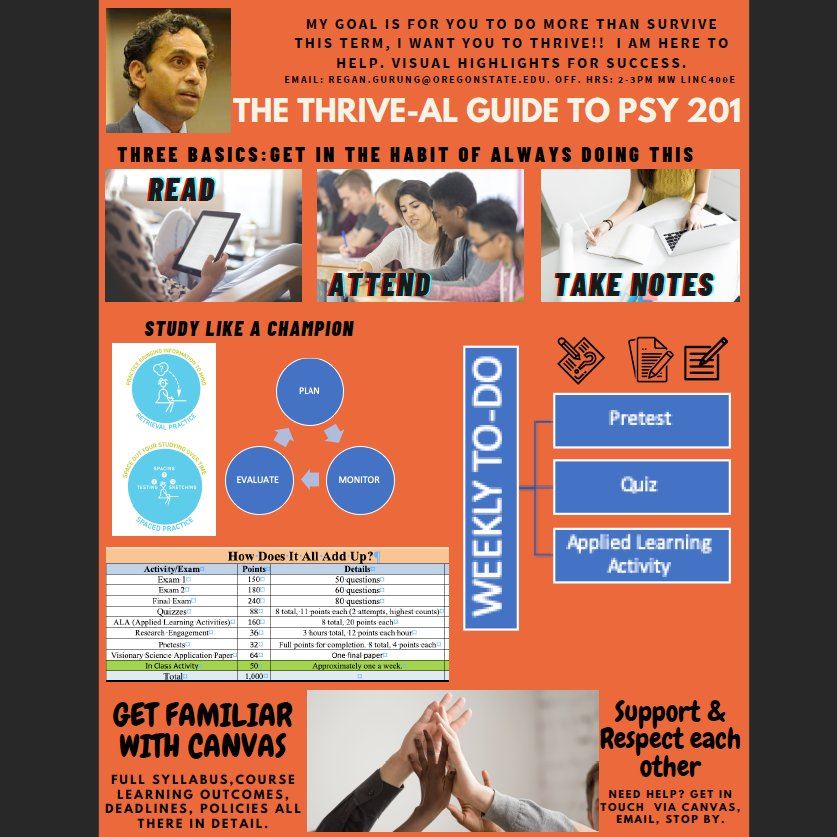 School name: Oregon State University
School name: Oregon State University
Type of school: Public Research
School locale (including state and country): Corvallis, Oregon, USA.
How many years have you taught psychology? 24
Classes you teach: Intro Psych, Research Methods, Health Psychology, Science of Teaching and Learning, Teaching Seminar.
Specialization (if applicable): Social/Personality
Average class size: 350 (Intro Psych); 30 (Teaching Seminar); 50 (Research Methods)
What’s the best advice about teaching you’ve ever received?
“Don’t sweat the small stuff, and its mostly all small stuff.”
“Evaluations will often feature outliers on both ends of the spectrum. Savor the highs. Note the lows. Be watchful for what is consistent across students either way.”
“Have a clear idea about why you are having students do something. It must have a purpose and the potential to help them learn (evidence based or research promise). It you cannot share why (tie it to your philosophy) then perhaps you should not have them do it.
Not everything you are told to do, should be done. Be critical of suggestions and educational buzzwords.
Take time for YOU. If you are not strong and rested, you cannot serve students well.
Practice what you teach- For any comment, email, otherwise (from student, colleague, or friend) may sure you do not react when you are tired, and without considering situational attributions – what is going on in that person’s life or day, next to the potential knee-jerk person attribution (that person is X).
What book or article has shaped your work as a psychology teacher?
Working on recent and current book projects, especially Thriving in Academic (with Pam Ansburg and Mark Basham), Study Like a Champion (with John Dunlosky), Model Teaching Criteria (with Aaron Richmond & Guy Boysen), and Transforming Introductory Psychology (with Garth Neufeld, co-editor and some of the most hard-working teachers I know, members of the APA Intro Psych Initiative).
 Briefly tell us about your favorite lecture topic or course to teach.
Briefly tell us about your favorite lecture topic or course to teach.
Absolutely love teaching about stress and coping and how to best study in the class topic category.
Because of the significance to life, I really enjoy teaching health psych and methods though have to admit one of the biggest thrills was to develop and teach a course called Gods, Ghosts, and Goblins: Why we believe.
Briefly describe a favorite assignment or in-class activity.
One of the most difficult things to do is students to tease apart the mechanics of science, and see how what to them seems like jargon, actually translates to life. One of my favorite activities is to first have students complete a survey with numerous scales from psych such as measures of personality, self esteem, health beliefs model, etc. The survey has no labels and this is early in the course (done it in both research methods and health psych). Once we cover material on the related topics I have them see if they can identify which scales were used based on the material taught/read. They develop hypotheses about how the different concepts are related, then I give them data from their own class and THEY analyze the data to practice their stats skills. Then they interpret the findings writing both an APA style abstract to practice technical writing and as a blog and twitter post to practice sharing science and ensuring they can talk about the concepts and findings confidently and in a way they can easily apply to life.
What teaching and learning techniques work best for you?
I am a big fan of sharing cognitive science with my students and really helping them to use it. I used to just talk about best practices, then I realized I should the time to PUT it INTO practice. Now each class period I have a practice retrieval exercise. I design assignments to explicitly foster spaced practice. I script classes to interleave materials from different chapters.
I am also comfortable with not being serious all the time and believe that I can be firm as long as I am fair and flexible. I try to be as genuine as possible and take pains to acknowledge that students have other classes than mine, and a life as well, often with multiple hardships and stressors.
 What’s your workspace like?
What’s your workspace like?
I like color and memory cues. My offices (I have two appointments so a Center for Teaching and Learning Office and a Psych one) have mementos from places I have been and numerous fun things students have given me. I also have some of my favorite family pictures around – even a glimpse at them on a hard day can make me automatically smile and feel stronger. Yes, there are a fair amount of little items but all of them have a story. There is always something to catch a students’ eye and it is a great ice-breaker.
Perhaps most often commented on are my collection of Barbie dolls. I taught a class on Culture, Development, and Health, and one component on gender development discussed the role of toys in shaping identity. I bought a “Barbie in India” in India (I was born and raised in Bombay) as an example of how toys shape minds around the world. On a whim I bought the same figure here in the US. Shockingly, the doll from India was fairer than the same doll made in the US. This makes for really thought provoking conversations on the whiteness.
Three words that best describe your teaching style.
Energetic, Engaging, Entertaining.
What is your teaching philosophy in 8 words or fewer?
Care
[If you really care about student learning you will take pains to learn how to do it well, invest the energy that it involves, and see every single student holistically and as one with potential.]
Tell us about a teaching disaster (or embarrassment) you’ve had and how you dealt with the situation.
Thankfully there was nothing big enough that it came to mind easily when I read this question. There have been the hiccups. One day the tech in room failed and I had to use the overhead projector and conduct the entire class writing on the plastic sheet from the material in my head (I did not print out a hardcopy of the day’s material). Another day, a student made a negative comment about “fast-food workers” and another student took offense as her mother raised her by working fast food. That was uncomfortable and I am not sure I did the best job alleviating the situation (I am more prepared now). And yes, once a student asked if I could say “Thank you come again” in a strong Indian accent aka Apu on the Simpsons. That was a great teachable moment that while very difficult was in the end I believe enlightening for all.
What about teaching do you find most enjoyable?
I love the energy of a classroom as student “get it” or revel in the new knowledge. It is a thrill when I run into them years later and they share what they remember or more so, when they get in touch and say how they use what they learning in their lives and in their jobs. I love trying to find a new way to do something and having it work, or the challenge of not having it work and trying again. I love the repeated opportunities for redemption—a day not go well, revise, go back and do it better!!
What is something your students would be surprised to learn about you?
I am a pretty open book so after a term with me they probably know I love to cook, am fascinated by identity, immigration, and history, do not have a wide range of musical genres I listen to. They may be surprised to know I broke my nose in a street fight in Bombay that had ties to nefarious mafia activity (not my ties).
What are you currently reading for pleasure?
To get my mind to stop whirling, I try to end every day and start every weekend morning, with something not connected to research or class planning and development. I try to only read if it is pleasurable and actually enjoy the stuff I have to read for ‘work’. Right now I am reading “Exterminate the Brutes” by Sven Lindquist, in which he traces European imperialism and exposes the diverse roots of racism, ideas expanded on by Caste (Wilkerson). I am also midway through John Burnett’s “Bangkok Haunts” a very different type of crime story (lots of cultural commentary in it).
What tech tool could you not live without?
Thankfully none.
What is your hallway chatter like? What do you talk to colleagues about most (whether or not it is related to teaching/school)?
A lot of conversations are around the great outdoors and fun activities planned for the weekend J. Oregon is a wonderful place to live.
Has your teaching changed because of the Covid19 pandemic? If so, how? (positive and/or negative changes)
It is all positive in that the pandemic gave me a chance to explore better ways to make all students feel inclusive, additional techniques to allow flexibility in types of assessments and assignments, and just to try to new things. This fall I am experimenting with ways to have students in my large gen psych course have backchannel conversations. I also am trying new ways to share syllabus information.
In the complete opposite of "Syllabus Day" (give syllabus and leave, and a tradition that should go extinct) I been dedicating the first full class to sharing how material applies to life, engaging activities, modeling participation, creating comfort, and explicitly talking about how to study. Students are often overwhelmed on day one and this may hamper attempts to process a full syllabus. So this term I tried something new. I rolled out the syllabus in two phases. On Day 1 of class they got a Syllabus Snapshot - One sheet. Visual. Key elements. Gentle entry. Easier read. We talk about it. The full syllabus with more details is available online. I am also think about ungrading and how that fits in.
PSYCHSESSIONS UPDATE: Listen to Regan talk with his buddy Eric Landrum in 2017 about his childhood in Bombay, Carleton College, and other topics! https://psychsessionspodcast.libsyn.com/e012-an-interview-with-regan-gurung

Regan would like STP folks to know about these upcoming books!
Thriving in Academia:
Building a Career at a Teaching-Focused Institution https://www.apa.org/pubs/books/thriving-academia
Transforming Introductory Psychology:
Expert Advice on Teacher Training, Course Design, and Student Success https://www.apa.org/pubs/books/transforming-introductory-psychology
An Evidence-based Guide to College and University Teaching
Developing the Model Teacher https://www.routledge.com/An-Evidence-based-Guide-to-College-and-University-Teaching-Developing-the/Richmond-Boysen-Gurung/p/book/9780367629847
